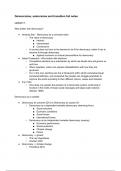Samenvatting
Democracies, Autocracies and Transitions full summary
- Instelling
- Universiteit Van Amsterdam (UvA)
This summary contains notes from all the lectures the University of Amsterdam gave for its Democracies, Autocracies and Transitions course (FY). Description given by the University of Amsterdam: In the first part of the course we discuss theories and empirical research on the emergence, stabilit...
[Meer zien]




